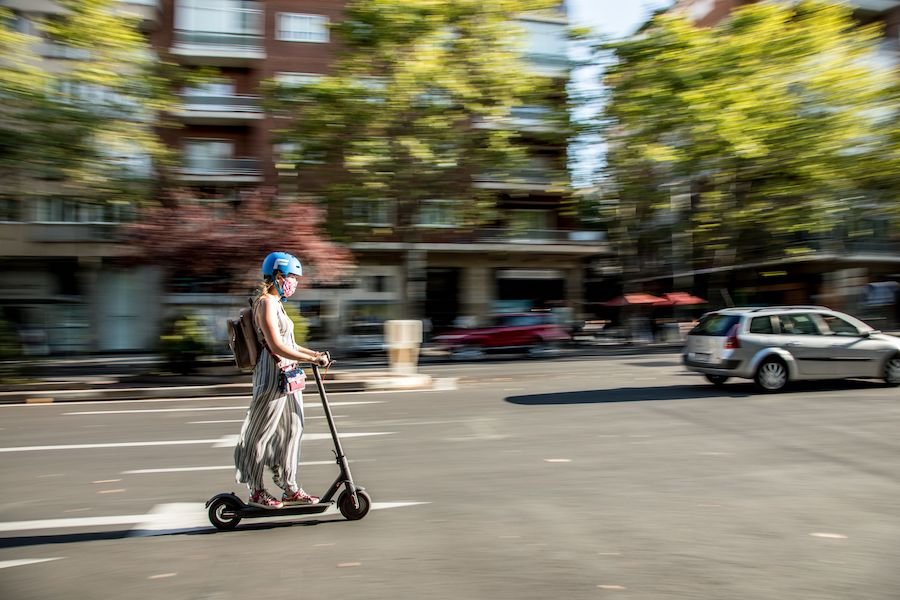Paris Voted to Ban Rental E-Scooters – Will Other Cities Follow in Its Footsteps?

The most recent example is Paris, where residents voted to ban rental e-scooters in a referendum held on Sunday.
Electric ride-sharing companies, such as Bird or Lime, have capitalized on the people’s need for a quick way to get around town. The problem isn’t with the companies. They do respect all regulations. But the issue rather lies with the companies using their services. We’ve been hearing more and more about e-scooter-related accidents across the globe. The first city to put a complete stop to e-scooter rentals is Paris.
Paris held a referendum on Sunday, and the results were clear – 89% of the votes were in favor of the ban, according to the city hall Twitter account. However, here’s the twist: only 7.46% of registered voters participated in the referendum.
The French capital’s mayor, Anne Hidalgo, said Paris would ban electric scooters from September 1. Given the massive financial losses that would incur, e-scooter operators said on Monday that they hoped to stop the plan. A spokesperson for Lime declared, “We remain hopeful that we can continue to work with Mayor Hidalgo to adopt sensible regulations instead of a ban on e-scooters and avoid a step backward for Paris.”
A spokesman for Dott, another e-scooter rental company, pointed at the extremely low turnout, declaring that it was heavily biased toward older age groups.
Many cities worldwide had to control the deployment of e-scooters by introducing specific regulations. Smartphone-operated electric scooters were introduced in Paris in 2018, and many companies rushed in on the opportunity. Following complaints about the massive deployment, Paris cut the number of operators to three in 2020.
According to Reuters, Paris offered companies a three-year contract, requiring that scooters’ speed be limited to 20 kph (12 mph) and designating scooter parking areas. Operators came up with regulations of their own, such as checking users were over 18, introducing license plates so offenders could be easily identified, as well as limiting the vehicles to one passenger.
Accidents still happen, even with all these regulations in place. In 2021, 24 people died in scooter-related accidents in France, including one in Paris. Last year, 458 accidents involving e-scooters and similar vehicles took place in Paris, three of which were fatal.
We’ll have to wait and see if the plan will be reverted and whether Paris will choose to enforce even tighter regulations instead of an outright ban. But these recent events might inspire other countries or cities to restrict or ban the use of rental e-scooters.
Take the U.K., for instance. A road safety charity, IAM RoadSmart, is raising awareness of the dangers of e-scooters following the referendum in Paris. The organization conducted a Safety Culture Report, surveying over 2,000 UK motorists on opinions of key road safety issues. The report revealed that e-scooters are similarly unpopular in Britain, with 68% of respondents being in support of a law totally banning e-scooters. Furthermore, 68% of respondents also declared that the growing number of e-scooters on the roads is a threat to their road safety.
Of course, the opinions differed depending on the age group – 74% of those over 70 felt most threatened by the EVs, compared to 59% of 17-34-year-old. Moreover, responses varied according to region. The residents of London and the West Midlands felt most under threat by the increasing number of e-scooters, so these regions are most likely to adopt a similar approach to what we’ve seen in Paris.
Perhaps banning e-scooters altogether isn’t the best solution, as many of the respondents thought. 86% of those surveyed said they support stricter regulation of the devices, including a law restricting e-scooters to cycle lanes only, enforcing age limits, and introducing rigorous design and construction standards.
The latest Department for Transport (DfT) statistics in the U.K. point toward a grim reality – there were 1,434 casualties involving e-scooters in Britain in 2021, 10 of which were fatal. In 2020, there were 484 casualties involving e-scooters. That means casualties have almost tripled over a 12-month span.
The U.K. still has no regulations for these vehicles, which can go up to 30 mph (48 mph) in some cases. It’s only normal that the public has concerns regarding their use, considering the massive increase in accidents and casualties.
Other cities around the world, such as Barcelona, Spain, have already introduced some restrictions. After an e-scooter exploded and caught fire last November on board a train in Barcelona, the city prohibited residents from bringing electric scooters onto public transport starting February 1, although only for six months.
No doubt traveling by e-scooters has its perks, but the statistics clearly point toward an issue. Even so, cities and governments should find other solutions than totally banning them.
Nouvelles connexes


